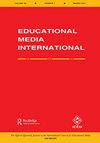Makerspaces pedagogy – supports and constraints during 3D design and 3D printing activities in primary schools
IF 1.4
Q2 EDUCATION & EDUCATIONAL RESEARCH
引用次数: 9
Abstract
ABSTRACT Makerspaces have been heralded as an effective way to support the development of 21st Century and STEM capabilities, yet there is a paucity of systematic, multiple-case analysis to guide educator and researcher practice. This collective case study examined 24 primary school classroom contexts to understand what supports and constrains learning and teaching in technology-oriented makerspaces. Thematic analysis of 24 teacher in-situ reflective journals and focus group interviews of all teacher participants revealed 19 supports and 11 constraints, relating to pedagogy, task design, learner attributes, technological factors, the school environment, and teacher capabilities and beliefs. These were used to form an evidence-based framework for learning and teaching in makerspaces. Findings are discussed in relation to previous research which has tended to be anecdotal and based on single cases. Implications for future teaching, research and policy initiatives are also detailed.创客空间教学法——在小学进行3D设计和3D打印活动时的支持和限制
创客空间被认为是支持21世纪和STEM能力发展的有效途径,但缺乏系统的多案例分析来指导教育工作者和研究人员的实践。这个集体案例研究考察了24所小学的课堂环境,以了解在以技术为导向的创客空间中,是什么支持和限制了学习和教学。对24份教师现场反思期刊的专题分析和对所有教师参与者的焦点小组访谈揭示了19项支持和11项限制,涉及教学法、任务设计、学习者属性、技术因素、学校环境和教师能力和信念。这些被用来形成一个以证据为基础的学习和教学框架。研究结果讨论与以往的研究,往往是轶事和基于单一的情况下。对未来的教学、研究和政策举措的影响也作了详细说明。
本文章由计算机程序翻译,如有差异,请以英文原文为准。
求助全文
约1分钟内获得全文
求助全文
来源期刊

Educational Media International
EDUCATION & EDUCATIONAL RESEARCH-
CiteScore
3.20
自引率
0.00%
发文量
10
 求助内容:
求助内容: 应助结果提醒方式:
应助结果提醒方式:


